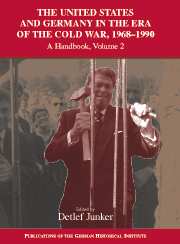Book contents
- Frontmatter
- POLITICS: Détente and Multipolarity: The Cold War and German-American Relations, 1968-1990
- 1 The United States and the German Question
- 2 The Federal Republic of Germany Between the American and Russian Superpowers - “Old Friend” and “New Partner”
- 3 Ostpolitik: Détente German-Style and Adapting to America
- 4 Creative Tension: The United States and the Federal Republic in the CSCE
- 5 The United States, Germany, and the Multilateralization of International Relations
- 6 Expectations of Dominance and Partnership Rhetoric: The Federal Republic of Germany in the Crossfire of American and French Policy, 1945-1990
- 7 West Germany and European Unity in U.S. Foreign Policy
- 8 Cooperation and Conflict in German and American Policies toward Regions Outside Europe
- 9 Two States, One Nation: The International Legal Basis of German-American Relations from Ostpolitik to Unification
- 10 The U.S. Congress and German-American Relations
- 11 The German Political Parties and the USA
- 12 The Role of East Germany in American Policy
- 13 The United States and German Unification
- SECURITY: German-American Security Relations, 1968-1990
- ECONOMICS: Cooperation, Competition, and Conflict: Economic Relations Between the United States and Germany, 1968-1990
- CULTURE: Culture as an Arena of Transatlantic Conflict
- SOCIETY: German-American Societal Relations in Three Dimensions, 1968-1990
- 1 “1968”: A Transatlantic Event and Its Consequences
- OUTLOOK: America, Germany, and the Atlantic Community After the Cold War
- Index
1 - The United States and the German Question
Published online by Cambridge University Press: 05 January 2013
- Frontmatter
- POLITICS: Détente and Multipolarity: The Cold War and German-American Relations, 1968-1990
- 1 The United States and the German Question
- 2 The Federal Republic of Germany Between the American and Russian Superpowers - “Old Friend” and “New Partner”
- 3 Ostpolitik: Détente German-Style and Adapting to America
- 4 Creative Tension: The United States and the Federal Republic in the CSCE
- 5 The United States, Germany, and the Multilateralization of International Relations
- 6 Expectations of Dominance and Partnership Rhetoric: The Federal Republic of Germany in the Crossfire of American and French Policy, 1945-1990
- 7 West Germany and European Unity in U.S. Foreign Policy
- 8 Cooperation and Conflict in German and American Policies toward Regions Outside Europe
- 9 Two States, One Nation: The International Legal Basis of German-American Relations from Ostpolitik to Unification
- 10 The U.S. Congress and German-American Relations
- 11 The German Political Parties and the USA
- 12 The Role of East Germany in American Policy
- 13 The United States and German Unification
- SECURITY: German-American Security Relations, 1968-1990
- ECONOMICS: Cooperation, Competition, and Conflict: Economic Relations Between the United States and Germany, 1968-1990
- CULTURE: Culture as an Arena of Transatlantic Conflict
- SOCIETY: German-American Societal Relations in Three Dimensions, 1968-1990
- 1 “1968”: A Transatlantic Event and Its Consequences
- OUTLOOK: America, Germany, and the Atlantic Community After the Cold War
- Index
Summary
Translated by Richard Sharp
Washington and Bonn both believed until the late 1950s that the German question could be resolved only by the German people exercising their right to self-determination through free elections and that only then would conditions for European détente exist. During the 1960s, however, the views of the two governments increasingly diverged. The fact that the Federal Republic of Germany was acting to some extent as a “gatekeeper” obstructed American work for détente because the German insistence on the primacy of reunification ran counter to Washington's demand for at least temporary recognition of the status quo in Europe.
In a complex process of bilateral readjustment, it became evident to the governments in Washington and Bonn that European détente was the top priority. As a result, the German question ceased to be so acute. By the early 1970s, the overall situation surrounding détente policy had undergone surprising changes: The treaty sought with the East by the West German government under Willy Brandt and Walter Scheel clearly went too far for Richard Nixon's administration. The Nixon government stopped short of open criticism but, behind closed doors, expressed fears that the new Ostpolitik being pursued by the Federal Republic was too accommodating toward the Soviet Union. As a result, Washington initially greeted Bonn's renewed initiatives in the field of détente policy with suspicion.
THE ATTITUDE OF THE NIXON AND FORD ADMINISTRATIONS TOWARD THE GERMAN QUESTION
The Nixon Administration initially harbored grave reservations about what Brandt called Ostpolitik. With each German state seeking to seduce the other, they might finally come together on some nationalist, neutral program, as Adenauer and de Gaulle had feared. . . . Above all, the Nixon Administration feared for the unity of the West . . . Washington viewed the specter of West Germany breaking out on its own with trepidation.
- Type
- Chapter
- Information
- The United States and Germany in the Era of the Cold War, 1945–1990A Handbook, pp. 18 - 25Publisher: Cambridge University PressPrint publication year: 2004

